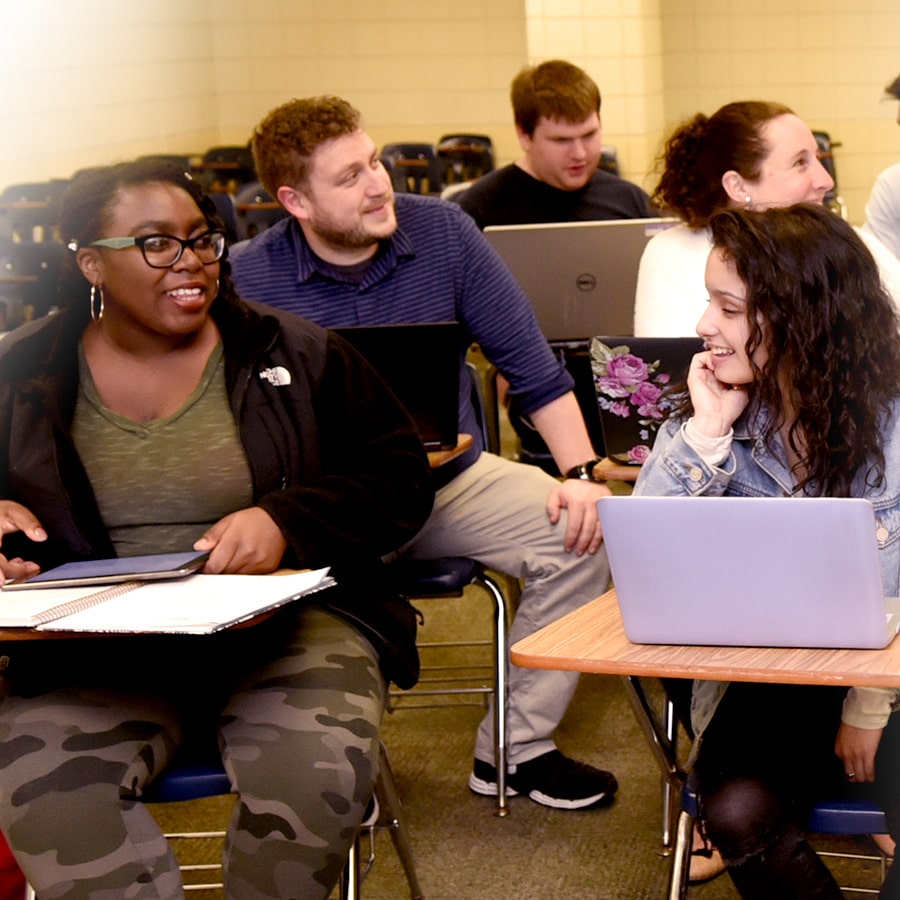Plan Your Education
How to Apply
Applicants must meet general graduate admission requirements in addition to the following program-specific requirements:
- Submit scores for the Communication and Literacy MTEL
- Please note: MTEL scores are optional for admission.
Deadlines & Cost
Deadlines
Middle/Secondary Initial Licensure: Applications to start in the fall are due by April 1 (priority deadline) and June 15 (final deadline). Applications to start in the spring are due by November 1 (priority deadline) and December 1 (final deadline).
Teach Next Year: Applications to start in the summer are due by March 15 (priority deadline) and April 15 (final deadline).
Application Fee: The nonrefundable application fee is $75. UMass Boston alumni and current students that plan to complete degree requirements prior to graduate enrollment can submit the application without paying the application fee.
Estimate Your Program Cost: Get a feel for your expected program costs using the Graduate Program Cost Calculator.
Program Cost Information: For more detailed information on costs, please visit the Bursar's website or send an email to Bursar@umb.edu. Please refer to Graduate Student Financial Aid for more information on financial aid.
Curriculum: Initial Licensure in Middle/Secondary Education Track
Course Requirements
Curriculum Core (15 Credits)
- EDC G 606 - Sociocultural Foundations of Education 3 Credit(s)
- EDC G 630 - Inclusion PreK-12:Diversity and Equity in Inclusive Settings 3 Credit(s)
- EDC G 644 - Developmental Stages across the Lifespan 3 Credit(s)
- EDC G 648 - New Literacies and Emerging Technologies across the Content Areas 3 Credit(s)
- EDC G 660 - Using Data to Plan Curriculum and Instruction 3 Credit(s)
Pre-Practicum Core (10 to 13 Credits)
- EDC G 643 - Fostering Equitable and Affirming Classroom Environments 3 Credit(s)
- EDC G 650 - Rethinking Equity and Teaching for English Language Learners 3 Credit(s)
- EDC G 658 - Pre-practicum seminar 1 Credit(s)
Methods Courses:
Those seeking licensure in middle school humanities must take both English and social studies methods.
Those seeking licensure in middle school math/science must take both math and science methods.
- APLING 611 - Methods and Materials in Foreign Language Instruction 3 Credit(s)
- EDC G 664 - Digital Literacies/Computer Science Methods 3 Credit(s)
- EDC G 665 - Science Methods 3 Credit(s)
- EDC G 662 - Social Studies Methods 3 Credit(s)
- EDC G 667 - English Methods 3 Credit(s)
- EDC G 669 - Math Methods 3 Credit(s)
Practicum Core (6 Credits)
- EDC G 687 - Graduate Practicum: Student Teaching Middle School Education 6 Credit(s)or
- EDC G 688 - Graduate Practicum: Student Teaching Secondary Education 6 Credit(s)
Concentration Courses (6 Credits)
Complete two courses from one of the concentrations below.
- English as a Second Language Concentration
- Special Education Concentration
- Digital Literacy/Computer Science Concentration
- Content Concentration
DESE Requirements for Additional License
English as a Second Language
- pass ESL OR ELL MTEL
- complete 150 hour ELL practicum
- apply to DESE for license
Special Education
- pass Foundations of Reading or Reading Specialist MTEL
- complete 150 hour special ed practicum
- apply to DESE for license
Instructional Technology
- apply for DESE license
Content
- pass Advanced Strategies class in content area
- pass EDC G 690 - Teacher Research for Professional Licensure
- teach for three years with DESE approved mentoring
- apply to DESE for license
For more information on curriculum, including course descriptions and degree requirements, visit the Academic Catalog.
Curriculum: Teach Next Year Middle/Secondary Initial Licensure
Course Requirements
Curriculum Core (12 Credits)
- EDC G 606 - Sociocultural Foundations of Education 3 Credit(s)
- EDC G 630 - Inclusion PreK-12:Diversity and Equity in Inclusive Settings 3 Credit(s)
- EDC G 648 - New Literacies and Emerging Technologies across the Content Areas 3 Credit(s)
- EDC G 660 - Using Data to Plan Curriculum and Instruction 3 Credit(s)
Pedagogy Core (12 Credits)
Complete four courses including one methods course.
- EDC G 643 - Fostering Equitable and Affirming Classroom Environments 3 Credit(s)
- EDC G 644 - Developmental Stages across the Lifespan 3 Credit(s)
- EDC G 696 - Independent Study 1-6 Credit(s)
Methods Courses
- APLING 611 - Methods and Materials in Foreign Language Instruction 3 Credit(s)
- EDC G 665 - Science Methods 3 Credit(s)
- EDC G 662 - Social Studies Methods 3 Credit(s)
- EDC G 667 - English Methods 3 Credit(s)
- EDC G 669 - Math Methods 3 Credit(s)
Practicum Core (12 Credits)
- EDC G 650 - Rethinking Equity and Teaching for English Language Learners 3 Credit(s)
- EDC G 663 - Assessment in Teaching 3 Credit(s)
- EDC G 687 - Graduate Practicum: Student Teaching Middle School Education 6 Credit(s)
or - EDC G 688 - Graduate Practicum: Student Teaching Secondary Education 6 Credit(s)
Initial License Requirements
Licensure will be approved when all courses are passed with a GPA of 3.0 or higher and initial level on PST Portfolio.
DESE Requirements for Additional License
English as a Second Language
- pass ESL OR ELL MTEL
- complete 150 hour ELL practicum
- apply to DESE for license
Special Education
- pass Foundations of Reading or Reading Specialist MTEL
- complete 150 hour special ed practicum
- apply to DESE for license
Instructional Technology
- apply for DESE license
Content
- pass Advanced Strategies class in content area
- pass EDC G 690 - Teacher Research for Professional Licensure
- teach for three years with DESE approved mentoring
- apply to DESE for license
Graduation Criteria
Program Requirements for Initial Licensure in Middle/Secondary Education Track
Complete a minimum of 37 credits from at least twelve courses including five curriculum core courses, four to five pre-practicum core courses, one practicum core course, and two concentration courses.
Concentration: Students may select a concentration in English as a second language, special education, digital literacy/computer science, or content (must be selected if the student did not major/minor in the subject they plan to teach). Students may also opt to mix and match concentration classes.
Capstone: Completion of a practicum portfolio.
Pre-practicum: Students will be placed in a classroom with English Language Learners for at least one full day a week or one period every day for a semester (at least 100 total hours) to conduct monitored fieldwork consisting of specified activities to complete course assignments. Students can opt to do five full days a week and combine their pre-prac and prac to have a year-long field experience. Prepracticum documentation and evaluations must be submitted with practicum applications.
Practicum: A full practicum is five-days a week for 14 weeks (one full semester) of supervised student teaching. All initial licensure candidates must take the 6-credit practicum seminar.
For both the pre-practicum and practicum, students must apply for approval and placement the semester prior to the one in which it is to take place.
Exams: Successful completion of the Communication and Literacy MTEL (must be passed before starting the curriculum core) and the Subject Area MTEL (must be passed before starting the pre-practicum core).
Schools and certain field sites will require CORI/SORI (Criminal/Sex Offender Record Information) and finger-printing prior to fieldwork. Allow enough time for results before planning your hours.
Competency 1 of the state’s regulations for licensure covers the knowledge base that teachers must bring to the classroom. For middle/secondary teachers, this is one of the disciplines taught in high school (e.g., English, History, Political Science/ Philosophy, French, Spanish, Biology, Mathematics, Physics, etc.). Most commonly, middle/secondary teachers are licensed in the fields in which they hold their BA or BS.
UMass Boston only endorses students for an initial license in a subject area. For an additional license, students need to pass the two courses in their chosen concentration core, complete the applicable DESE requirements listed on their own, and apply to DESE directly after obtaining a content area initial license.
Students should keep all syllabi, fieldwork documentation, assignments, and transcripts.
Minimum grade: At least a 3.0 cumulative GPA with no incompletes for courses in prior cores to move on to the next core.
Statute of limitations: Five years.
Program Requirements for Teach Next Year Middle/Secondary Initial Licensure
Complete 36 credits from eleven courses including four curriculum core courses, four pedagogy core courses, and three practicum core courses.
Capstone: Completion of a practicum portfolio and passage of the MTEL.
Practicum: Complete a 450-hour pre-practicum and practicum over the entire school year, September to June.
Exams: Successful completion of the Communication and Literacy MTEL and the Subject Area MTEL before graduation.
Schools will require CORI/SORI (Criminal/Sex Offender Record Information) and fingerprinting prior to fieldwork. Allow enough time for results before planning your hours.
Competency 1 of the state’s regulations for licensure covers the knowledge base that teachers must bring to the classroom. For middle/secondary teachers, this is one of the disciplines taught in high school (e.g., English, History, Political Science/ Philosophy, French, Spanish, Biology, Mathematics, Physics, etc.). Most commonly, but not always, middle/secondary teachers are licensed in the fields in which they hold their BA or BS.
UMass Boston only endorses students for an initial license in a subject area. For an additional license, students need to complete additional course work or workshops, complete the applicable DESE requirements listed on their own, and apply to DESE directly after obtaining a content area initial license.
Students should keep all syllabi, fieldwork documentation, assignments, and transcripts.
GPA: A minimum GPA of 3.0 must be maintained throughout the program.
Statute of limitations: Five years.
Contact
Graduate Program Director Christopher Martell
christopher.martell [at] umb.edu

Curriculum & Instruction
Learn more about UMass Boston's Curriculum & Instruction department, our research, and our faculty.
Explore the Department of Curriculum & Instruction
College of Education & Human Development
Learn more about the faculty, research, and programs that make up our College of Education & Human Development.
Explore College of Education & Human Development